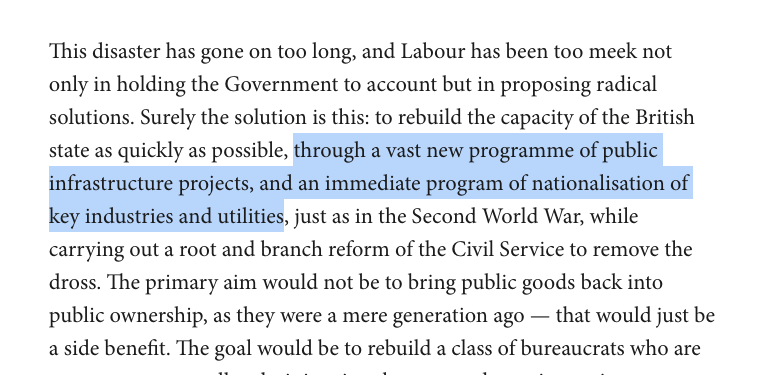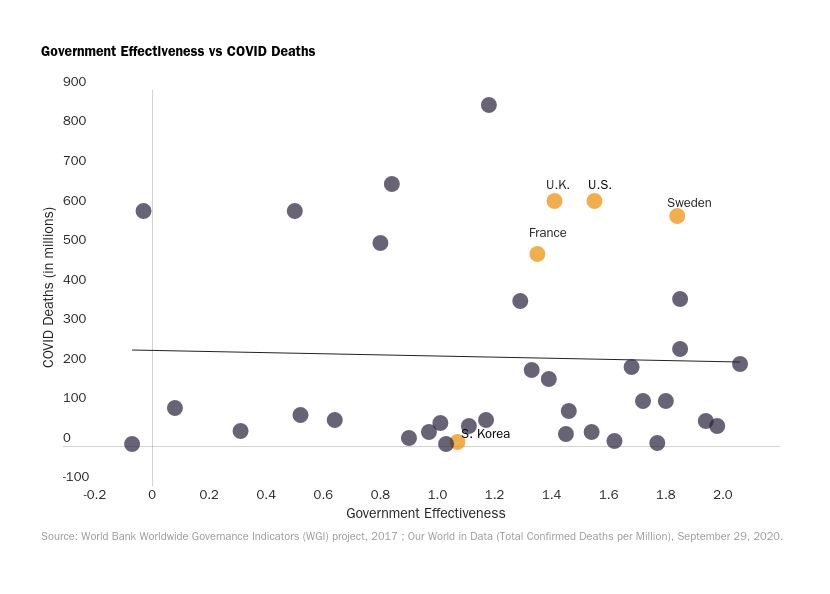The British state has indeed failed disastrously, but so have more extensive states in Europe.
It doesn't make much sense to say that the UK's problem is too much privatization when France has vaccinated 500 people *in total* so far. https://unherd.com/2021/01/who-are-covids-guilty-men/
It doesn't make much sense to say that the UK's problem is too much privatization when France has vaccinated 500 people *in total* so far. https://unherd.com/2021/01/who-are-covids-guilty-men/
We have measures of state capacity and state effectiveness. There's no correlation between them and having had a less bad Covid epidemic (charts via @MrRBourne).
Nor is there any relationship between the size of govt (as measured by govt consumption) and Covid deaths. https://twitter.com/MrRBourne/status/1311714812238364672
It's tenuous to argue that because our Covid response was bad, we must have low state capacity by definition – in this case "state capacity" doesn't tell us anything, you just mean "Covid response effectiveness".
State capacity as a measure of a state's ability to do things like raise taxes and fight challenges to its authority seems useful. As a measure of "how quickly did you abandon your herd immunity strategy", it seems useless.
The problem has been the decisions we've made, not our ability to implement them. The UK had bad scientific advice at the start, politicians like Rishi Sunak who prioritised "the economy" over suppressing the virus, and a dithering PM who keeps leaving things to the last minute.
But there is something that constrains big, effective states' ability to do new things quickly.
I'm with Mancur Olson in thinking that this is a sclerosis that occurs as rent-seeking interest groups ("stakeholders") become embedded across society & state. https://www.amazon.co.uk/Rise-Decline-Nations-Stagflation-Rigidities/dp/0300030797
I'm with Mancur Olson in thinking that this is a sclerosis that occurs as rent-seeking interest groups ("stakeholders") become embedded across society & state. https://www.amazon.co.uk/Rise-Decline-Nations-Stagflation-Rigidities/dp/0300030797
Thinking of this as state capacity is wrong, IMO. If the British state faced an existential threat – a civil uprising or widespread refusal to pay taxes – I think it would swiftly and effectively deal with it.
Institutional sclerosis is more about the accumulation of interest groups who all want a share of the state's spoils, and stand to lose out from change.
Nationalising large swathes of the economy, as the original piece proposes, would make that rent-seeking worse, not fix it.
Nationalising large swathes of the economy, as the original piece proposes, would make that rent-seeking worse, not fix it.
I don't have an answer to how you *do* fix it, if that is one of our problems (it's separate to Rishi Sunak subsidising restaurant meals in a pandemic, to be clear).
Olson says major shocks like wars can do it. But I would have hoped a pandemic would do it too. Apparently not.
Olson says major shocks like wars can do it. But I would have hoped a pandemic would do it too. Apparently not.
PS: I am *not* saying that "sclerosis" is the UK's main problem. Poor decision making and poor leadership is – a lot of this is not to do with incentives or structural issues, like the "infect everyone to get herd immunity" strategy we had in March. https://twitter.com/BergAslak/status/1346406798371262464
So my "institutional sclerosis" hypothesis is NOT meant to explain why we told everyone to go on holiday to Spain in August.
But it might explain the "Computer Says No" problems we are having in, eg, vaccines being given in crowded, unventilated GP clinics instead of car parks.
But it might explain the "Computer Says No" problems we are having in, eg, vaccines being given in crowded, unventilated GP clinics instead of car parks.

 Read on Twitter
Read on Twitter




